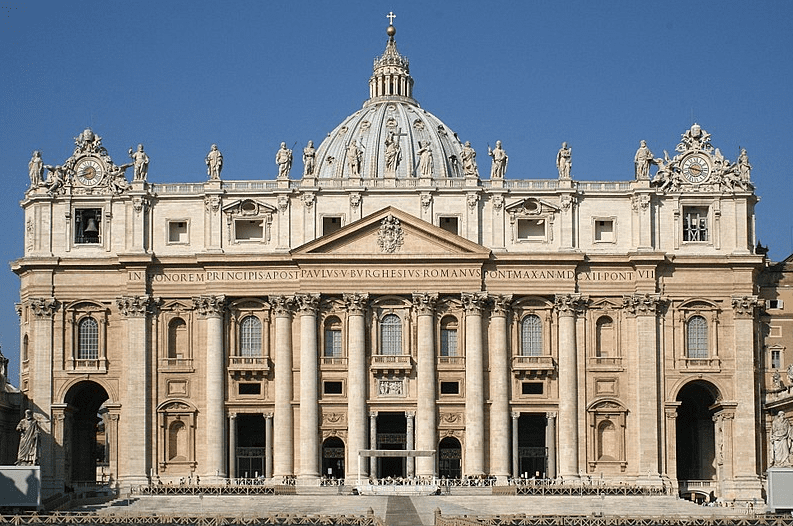Introduction: In this article – part of an ongoing “Introduction to Genealogy” series – Gena Philibert-Ortega writes about what Catholic Church records might exist, and where you may find them. Gena is a genealogist and author of the book “From the Family Kitchen.”
Do you have Catholic ancestors? If you do, you’re in luck because the Catholic Church has been keeping records of its members since the late 16th century. Those Church records help to link children to parents, which is exactly what genealogists seek to do as they research their family lines.

Before you go looking for records for your family, let’s start with a short history and then move on to what records might exist, and where you may find them.
The Council of Trent
In response to the Reformation, The Council of Trent was held in Trento, Italy, from 1547 to 1563. This gathering denounced Protestantism, defined doctrine, reaffirmed practices, and issued statements about practices. It also decreed that parish priests keep records on individual members, and that copies of those records be sent to the bishop – which means that not only were records kept but duplicate copies were made. Complete compliance with record-keeping took a few decades, but you may find certain types of records dating back to the late 1500s.
Types of Records
What Catholic Church records might you expect to find for your ancestor? Extant records may differ depending on place and location, but a few examples include:
- Baptism Records: May provide the name of the person being baptized, parents’ names (in some cases the mother’s maiden name), sponsors’ names, dates of birth and baptism.
- Confirmation Records: May provide the name of the child and maybe the name of the father.
- Marriage Records: May contain bride and groom’s name, parents’ names (in some cases, mother’s maiden name), witnesses’ names, date of marriage, date of birth for bride and groom, and church where they were baptized. If the bride or the groom were widowed, their previous spouse may also be named. One type of Catholic marriage records, Marriage Investigations, were done prior to marriage by the priest to make sure the couple was able to be married and not closely related, currently married, or a member of the clergy, and of proper age. These records can include more genealogically relevant information such as the names of both sets of parents and their origins.
- Burial Records: May contain name of deceased, deceased’s age, death and burial dates, cause of death and place of burial.
Aside from Church records, records associated with Catholic institutions such as hospitals, orphanages, schools, and cemeteries should also be searched. For example, school records may include yearbooks, histories, and newspapers. In addition, if your ancestor had a vocation, you may find records documenting their life’s work.
Where Are the Records?
You can learn more about what Catholic Church records are available by conducting a FamilySearch Catalog “Place” search for the location you are researching. Include the subject category “Church Records” (make sure to search the county and city your ancestor lived in).
To learn more about Church records and possible collections, search the FamilySearch Research Wiki for the name of the country you are researching and the word “genealogy.” You can then choose the link for “Church Records” found on the right-side of the page under “Record Types” to learn more about what records are available and how to access them. You can also search the Wiki with the name of the country and the phrase “Catholic Church.”
Diocesan archives and even non-Church related archives might also have the records you need. Search for the archdiocese where your ancestor lived in the worldwide archival catalog ArchiveGrid.
It’s Not All Online
After a search of FamilySearch, genealogy websites, and archival catalogs, you may need to contact the parish where your ancestor worshipped. To find the correct parish you can check historical city directories and newspapers from the time your ancestor was alive. There are a number of Diocesan Locator websites including the United States Conference of Catholic Bishops Diocesan Locator.
If you are unable to visit the parish where the records are stored, you can write to the church for the records – but you may need to be patient. Their priority isn’t answering genealogical requests, so your answer may come slowly or not at all. Consider including in your written request the name of the person you are needing records for, the event and the date of the event, your relationship to the person, and that you are requesting it for family history research. You will probably need to pay a fee, so you can either add a monetary donation to your request or inquire in your letter about any fees.
After contacting the parish, you may learn that the parish does not have the records you need because they are stored at a diocese archive. The diocese archive might have more information available about its holdings and research on its website.
If you’re researching a 20th century Catholic family member, don’t forget to check historical newspapers for articles about church activities and possible mentions of your ancestor and involvement in the church.
Get Started!
If you have never searched for Catholic Church records, now’s the time. Church records not only serve as alternatives to government-issued vital records but they also help place your ancestor in a specific location and time. They also help you better understand your ancestor’s life.
Related Article:
